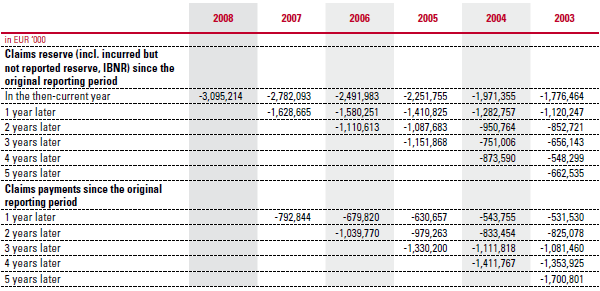GENERAL INFORMATION
If claims are asserted by or against policyholders, all amounts that a company in the Vienna Insurance Group’s property and casualty segment pays or expects to have to pay to the claimant are referred to as losses and the costs of investigating, adjusting and processing these insurance claims are referred to as “claims handling expenses’. Within the framework of its property and casualty insurance policies, Vienna Insurance Group has formed provisions by segment, extent of cover and year for each Group company, to pay for losses and claims handling expenses due to insurance claims.
Losses and claims handling expenses can be divided into two categories: provisions for known but not yet processed insurance claims and provisions for insurance claims that have been incurred but have not yet been reported (“IBNR”). Provisions for insurance claims that have yet to be processed are based on estimates of future payments, including the claims handling expenses for these insurance claims. These estimates are made on the basis of individual cases, in accordance with facts and circumstances discoverable at the time the provision is made. These estimates reflect the well founded judgement of Group adjusters based on general practices for forming insurance provisions and a knowledge of the nature and value of each type of claim. These provisions are adjusted regularly during normal processing and represent the expected eventual costs necessary to finally settle all pending reported insurance claims, taking into account inflation and other company and economic factors that could affect the amount of provisions that are required. Historical developments in distribution models and claims payments, the level of reported and not yet processed insurance claims and the nature of the extent of cover are also taken into account. In addition, court decisions and economic conditions can also affect the estimate of provisions and the eventual level of claims.
IBNR provisions are formed to counterbalance the expected costs of losses that have already occurred but have not yet been reported to the individual Group companies. These provisions, just like the provisions for reported insurance claims, are formed to counterbalance the expected costs (including claims handling expenses) necessary to finally settle these claims. Because at the time the provisions are formed the losses by definition are as yet unknown, the Group calculates its IBNR liabilities based on historical claims experience, adjusted by current developments in terms of claims-related factors. These provisions are based on estimates made using actuarial and statistical forecasts of the expected costs to finally settle these insurance claims. The analyses are based on the facts and circumstances known at the relevant time and on expectations
regarding legal and/or economic factors that determine the level of loss, such as case law, the inflation rate and labour costs. These provisions are regularly reviewed and revised once additional information is known and insurance claims are actually filed. The time needed to learn of these insurance claims and settle them is an important factor that must be taken into account when forming provisions. Insurance claims which are easy to settle, such as property damage in automobile insurance, are reported within a few days or weeks and are normally settled within a year.
More complicated insurance claims, such as bodily injury under automobile or general liability insurance, typically require longer processing times (on average four to six years, sometimes significantly longer). Also, difficult insurance claims where settlement regularly depends on the results of often protracted litigation, lead to substantially longer settlement times, especially in the liability, accident, building and professional liability insurance segments.
The ultimate costs of the claims and claims handling expenses depend on a series of variable circumstances. Between the time a claim is reported and its final settlement, changing circumstances may require that the provisions formed be revised upwards or downwards. For example, changes in the legal environment, the outcome of litigation and changes in medical costs, costs for materials for auto and house repair and hourly wage rates can have a substantial effect on the costs of insurance claims. These factors may result in actual developments differing from expectations – sometimes substantially. Loss reserve estimates are regularly reviewed and updated, using the most recent information available to management. Any changes to estimated reserves are reflected in operating results. The Vienna Insurance Group’s conservative policy toward reserves is documented not least by the fact that liquidation of loss reserves regularly leads to a profit.
Based on the Group’s internal procedures, management, based on the information currently available to it, believes that the Group’s provisions in the property and casualty division are adequate. However, forming loss reserves is by nature an uncertain process, and therefore no guarantee can be given that, in the end, losses will not differ from the Group’s initial estimates.
CHANGE IN GROSS CLAIMS RESERVE
The following table shows changes to the Vienna Insurance Group’s loss reserves at the end of each year indicated. The provisions reflect the amount of expected losses, based on insurance claims that occurred in the current and all previous loss years which were not paid as of the reporting date, including IBNR.
Evaluating the information contained in this table requires caution, because each amount contains the effects of all changes from the previous periods. The circumstances and trends that in the past affected liability could possibly recur in the future and therefore no conclusions can be drawn from the information given in this table as to future results.


